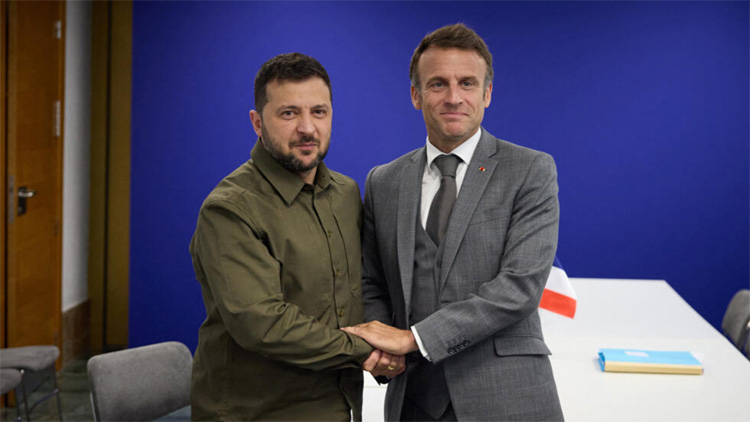Zelensky to sign security pacts with Germany, France on Friday
Ukrainian President Volodymyr Zelensky is traveling to Berlin and Paris on Friday to sign security pacts with German Chancellor Olaf Scholz and French President Emmanuel Macron, officials said.
Zelensky’s trip to the European Union’s two largest countries comes as Moscow’s invasion of Ukraine enters a third year.
Kyiv’s troops face an increasingly difficult situation on the eastern frontlines because of ammunition shortages and fresh Russian attacks.
Zelensky and Scholz were due to sign a bilateral security pact on Friday covering Ukraine’s “long-term security commitments and support,” the German government said.
The French president’s office said Macron and Zelensky planned to sign a security agreement at the Elysee Palace on Friday evening.
“This agreement follows commitments made within the G7 format on the sidelines of the NATO summit in Vilnius in July 2023,” Macron’s office said on Thursday.
At the time, NATO leaders did not set a timetable for Ukraine to join the bloc, but the G7 countries pledged to provide Ukraine with long-term security support.
“We are determined to defeat this bet that Russia is making” on “the long term, of us running out of steam,” a presidential adviser told AFP.
The United Kingdom and Ukraine signed a bilateral security agreement in January, and Kyiv is in talks with other countries.
Such security deals may include the provision of modern military equipment and the training of Ukrainian soldiers.
Zelensky’s office also said he would address the Munich Security Conference on Saturday, where he will hold talks with US Vice President Kamala Harris.
The Ukrainian leader was also set to hold meetings with the leaders of the Czech Republic, Denmark, and the Netherlands.
Since Russia’s invasion of Ukraine in 2022, France has been one of Kyiv’s top supporters.
Macron said in January that he planned to visit Ukraine in February, but his team did not provide further details.
Macron has pushed France’s defense industry to switch to “war economy” mode and ramp up production.
In January, the French president called on European countries to prepare to back Ukraine in case Washington decided to pull the plug on aid.

